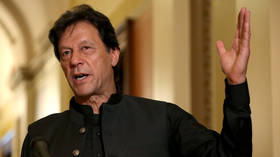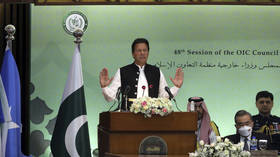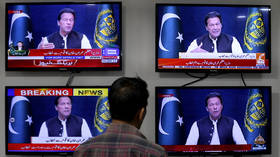Was the US involved in Pakistani PM’s departure, as he claims?

In the aftermath of an off-the-cuff remark made by US President Joe Biden about Russian President Vladimir Putin (“For God’s sake, this man cannot remain in power!”) which many believed articulated a policy of regime change, Secretary of State Antony Blinken was compelled to issue a public clarification. “We do not,” Blinken told reporters, “have a strategy of regime change in Russia or anywhere else for that matter.”
Tell that to the supporters of Pakistan’s former Prime Minister, Imran Khan, who this past weekend was removed from power after a vote of no confidence in the Pakistani Parliament which many believe was orchestrated by the United States, who had grown increasingly wary of the former cricket star’s criticism of US policy in the region and the world.
The constitutional crisis which brought down Imran Khan will shape how Pakistan will fit into a new world order that is emerging from the fallout of Russia’s incursion into Ukraine. At the heart of Pakistani crisis is the worsening of the country’s relations with the US. This relationship has always had an element of tension that had been covered over through the maintenance of an alliance of convenience which emerged in the aftermath of 9/11, where both Pakistan and the US found common cause in the defeat of radical Islamic fundamentalism in neighboring Afghanistan. The inability of the US-led coalition to defeat the Taliban in Afghanistan led to a growing bitterness inside Pakistan, creating the conditions for Imran Khan’s rise to power in 2018. Khan was supported by the Pakistani military and intelligence services who, like Khan, had grown weary of an American “forever war” in Afghanistan which had bled over onto Pakistani soil, leading to tens of thousands of deaths and domestic unrest.
The current sour state of US-Pakistani relations more fully manifested itself after the withdrawal of US and NATO forces from Afghanistan in August 2020, and the subsequent Taliban victory. It was furthered when, on the eve of Russia’s incursion into Ukraine, Khan visited Moscow for a high-profile meeting with Russian President Vladimir Putin. The meeting had been planned months prior, long before to the Russian decision to carry out its military operation in Ukraine. According to a statement made to the Pakistani Parliament on the eve of its no-confidence vote, the outgoing Foreign Minister, Shah Mahmood Qureshi, a close political ally of Khan who serves as the vice-chairman of Khan’s Pakistan Tehreek-e-Insaf party, “the national security adviser of the United States [Jake Sullivan] called our national security adviser [Moeed Yusuf] and categorically asked us not to proceed with the Russia tour.”
From the Pakistani point of view, the purpose of the delegation was to advocate dialogue and diplomacy, with Pakistan remaining a neutral party to the Russia-Ukraine conflict. “Where in the world does any sovereign state gets direction from other countries and which independent country accepts such directions?” Qureshi declared.
At the heart of Khan’s push to avoid a no-confidence vote in the Parliament was his assertion that the US has promised “severe consequences” for Pakistan if Khan was not removed from office through Parliamentarian action. According to Khan, Donald Lu, the Assistant Secretary of State for the Bureau of South and Central Asian Affairs, issued this warning to the Pakistani Ambassador to the US, Asad Majeed Khan, on March 7, 2022.
A US State Department spokesperson, Jalina Porter, noted in response that “there is absolutely no truth to these allegations.”
Imran Khan and his political allies have used the allegations of US interference to justify the dismissal of a vote of no confidence in the National Assembly the lower chamber of Pakistani parliament, where, because of recent defections, Khan’s party had lost majority control. Pakistan’s President, Arif Alvi, a close political ally of Khan, dissolved the Assembly and called for new elections in 90 days. Khan’s political opponents have questioned the constitutionality of these actions, and the case was subsequently heard by the Pakistani Supreme Court.
Khan’s conspiracy theories regarding US interference were mooted by the Pakistan Chief Justice, Jamal Khan Mandokhail, who questioned whether Khan had a right to discuss the reason behind the no-confidence vote, noting that the decision to have such a vote was derived from the fact that Khan’s party had lost its parliamentary majority, and not because of any foreign interference. The Supreme Court eventually ruled against Khan, paving the way for the vote of no-confidence.
Even with this set-back, Khan was not yet finished with his bid to try and hold onto power. Recognizing the reality that any challenge to the Supreme Court’s ruling is doomed, Khan sought to bring the powerful Pakistani Army and intelligence services on his side. Khan issued orders to replace the incumbent Chief of the Army Staff, General Qamar Javed Bajwa, with the former Inter-Services Intelligence (ISI) chief, Lieutenant General Faiz Hameed, who had been appointed as Peshawar Corps Commander back in October 2021. Hameed was seen as someone who was more sympathetic to Khan’s position that the US was interfering with the internal affairs of Pakistan.
Khan had been swept into power in 2018 on the strength of a third-party ticket that had the support of the Army. However, since that time, relations between him and his military had soured, reaching a culminating point when, last year, Khan opposed the appointment of Lieutenant General Nadeem Anjum, an acolyte of General Bajwa, as the new head of the ISI. Khan eventually relented, but not before drawing the ire of Bajwa, who began making public pronouncements critical of Khan’s policies toward India and Afghanistan. The animosity between Khan and Bajwa came to a head when, in late March 2022, Bajwa informed Khan that the Army was taking a neutral stance on the issue of the no-confidence vote, and that the Army did not agree with Khan’s assessment regarding US interference in the affairs of Pakistan.
Khan’s last-ditch attempt to replace Bajwa with his ally Hameed failed, and Khan had no choice but to respect the instructions of the Supreme Court and allow the vote of no confidence to proceed, leading to his ouster from office.
Pakistani politics is a rough and tumble sport that leaves many of its participants bloodied, imprisoned, or dead. Khan’s tumultuous tenure as Prime Minister was no exception to this rule. Many of Khan’s problems were derived from his failure as a politician, leading to economic difficulties in Pakistan that undermined his popularity. Khan opted to exploit his populist approach to governing by using the collapse of the US position in Afghanistan to promulgate policies which sought to break with Pakistan’s history of leaning toward the West. These policies put him at odds with the Army and his political opposition, creating the ideal conditions for the implementation of classic US “soft power” tactics which rely on using US economic pressure to achieve a domestic political result.
To claim that the US was solely responsible for Imran Khan’s political demise is to depart from reality—Khan, in playing the anti-West populist card had sown the wind, and the negative reaction from the Army and the Pakistani population was the whirlwind he subsequently reaped. On the other hand, simply writing off Khan’s claims of undue influence is premature. To pretend that the US did not seek to exploit Pakistani domestic turmoil to push Khan from power likewise ignores the reality of US regime change policy today.
Soft-power regime change is about not being obvious—it is by design intended to exploit domestic political frailties and weaknesses to produce an outcome that shields the US from direct blame—hence the characteristic non-denial denials, where Washington doesn’t deny the Sullivan and Lu interactions with their Pakistani counterparts, only the malign intent attached to those conversations by Imran Khan.
Gone are the days of supporting military strongmen—US regime change policy today is executed using the tool of “democracy”, underwriting so-called “color revolutions” to remove elected officials who have run afoul of American geopolitical objectives. While the no-confidence vote that removed Imram Khan from power has not been formally designated as a “color revolution”, it achieved the same result. Simply put, if the US diplomatic interventions were, as Khan claimed, intended to hasten his departure from office, it would be regime change by any other name, despite Antony Blinken’s denials to the contrary. The fact that this conclusion is up for dispute can either be linked to the imagination of Khan, or the effectiveness of the US government in creating plausible deniability. One fact that is not in dispute is that the US is relieved not to have to deal with Pakistan’s populist former Prime Minister going forward.
The statements, views and opinions expressed in this column are solely those of the author and do not necessarily represent those of RT.

















